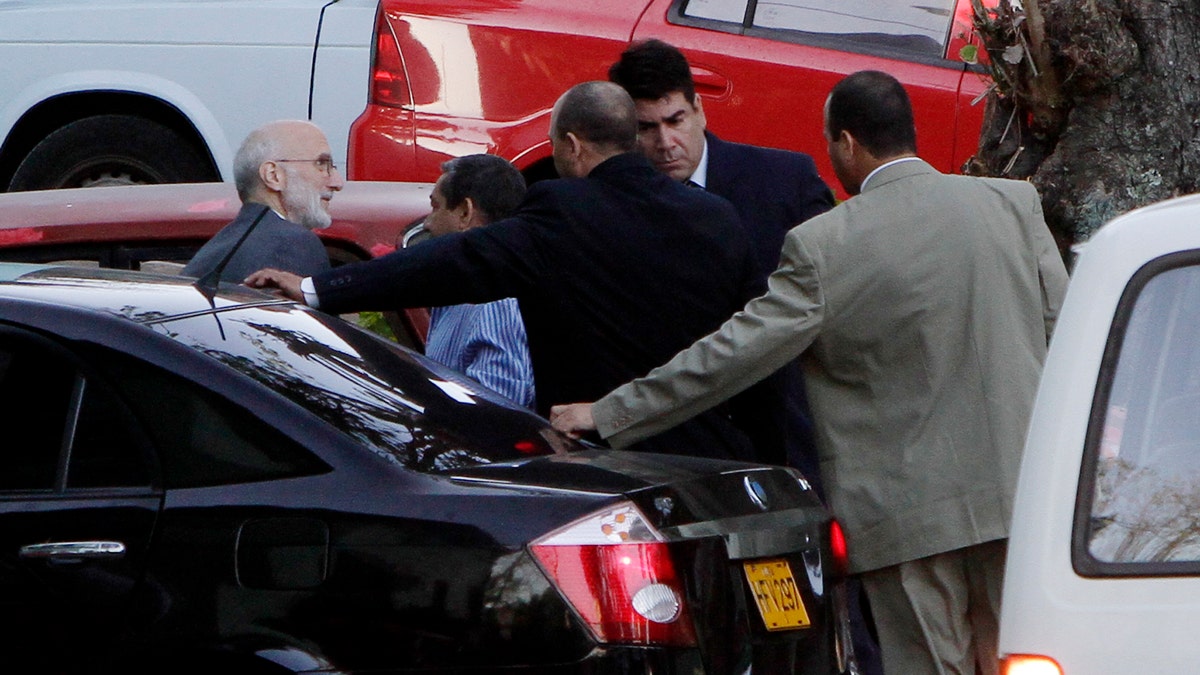
U.S. government contractor Alan Gross, left, is surrounded by security forces as he arrives for his trial in Havana, Cuba. Gross, a 61-year-old Maryland native, was arrested in December 2009 and charged with undermining Cuba's government by bringing communications equipment onto the island illegally. (AP2011)
HAVANA-- An American government contractor imprisoned in Cuba made a final appeal Friday to have his 15-year prison sentence reduced or dismissed, and a senior U.S. diplomat said Washington hopes he eventually will be released.
Alan Gross has been held since his arrest in December 2009, accused of bringing satellite and other communication equipment into the country illegally. He has acknowledged he was working on a USAID-funded democracy program, but says he meant no harm to the government and was only trying to help the island's small Jewish community.
Cuba considers the $20 million-a-year programs a threat to its sovereignty and has used the case to expose what it sees as Washington's long history of meddling in its internal affairs.
Julissa Reynoso, the U.S. deputy assistant secretary of state for Western Hemisphere affairs, told The Associated Press the United States was following the case closely.
"We hope that Alan Gross is released," she said.
Gross' Cuban attorney, Nuris Pinero, arrived at the Supreme Court on Friday morning to present oral arguments. She and other participants emerged less than two hours later after the hearing apparently concluded.
Gross, who was wearing a dark suit, was seen from a distance exiting the courthouse guarded by state security agents, and getting into a brown car. Representatives of the U.S. Interests Section, which Washington maintains in Havana instead of an embassy, were also present. Journalists were not allowed inside.
Cuban authorities said in a message published in official media following the session that Gross had exercised his right to address the court and had thanked the judges for the opportunity to explain his case personally.
The court will rule "in the coming days," the statement read.
Gross' U.S. attorney, Peter J. Kahn, said later Friday that during the hearing, "Alan reiterated that he never had any intention of hurting the Cuban government or its people, and that he has always believed -- and still does so today -- in the sovereignty of the Cuban nation and its people."
"As Alan's (Cuban) attorney argued to the Court, Alan's conviction and sentence to 15 years in a Cuban prison is not warranted by either the law or the facts of his case," Kahn said. "We remain hopeful that the ruling from Cuba's Supreme Court is one that will allow Alan promptly to be reunited with his family after having served nearly 20 months in a Cuban prison."
While U.S. officials have said they do not anticipate Gross' conviction being overturned outright, there is hope that the end of the legal process might clear the way for his release on humanitarian grounds. Gross has lost 100 pounds in jail, and several of his family members are suffering from serious illnesses.
Cuban officials have said privately they are sympathetic to humanitarian appeals, but would not consider them until Cuba's Supreme Court weighs in.
Gross' arrest sparked debate in Washington over the efficacy of the democracy programs, which are passionately supported by several Cuban-American politicians. In April, Senate Foreign Relations Committee Chairman John Kerry put a hold on funding, arguing that the programs don't work and have in fact harmed U.S. interests.
"There is no evidence ... that the democracy promotion programs, which have cost the U.S. taxpayer more than $150 million so far, are helping the Cuban people," Kerry said at the time. "Nor have they achieved much more than provoking the Cuban government to arrest a U.S. government contractor."
Kerry said last week he was close to ending the funding hold after getting assurances from USAID and the State Department that the money would be used more wisely in the future.
Reynoso told AP the democracy programs, which originally were explicit in trying to foment regime change in Cuba, had been significantly altered since President Barack Obama took office. Other State Department officials pointed to efforts to target new funding to support minorities such as the island's gay and lesbian community, as well as people of Afro-Cuban descent.
"The programs have gone through an elaborate review over the last year and a half, two years, and we believe that these programs help the Cuban people, give them greater opportunities, provide for access to information and access to human rights tools," Reynoso said.
